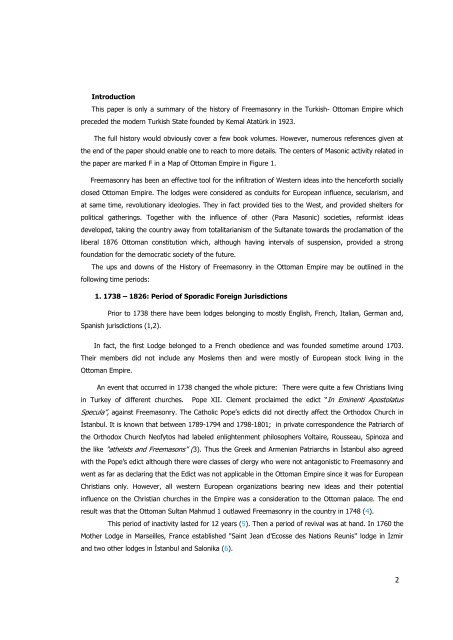A Concise History of Freemasonry in the Ottoman Empire Altay ...
A Concise History of Freemasonry in the Ottoman Empire Altay ...
A Concise History of Freemasonry in the Ottoman Empire Altay ...
Create successful ePaper yourself
Turn your PDF publications into a flip-book with our unique Google optimized e-Paper software.
Introduction<br />
This paper is only a summary <strong>of</strong> <strong>the</strong> history <strong>of</strong> <strong>Freemasonry</strong> <strong>in</strong> <strong>the</strong> Turkish- <strong>Ottoman</strong> <strong>Empire</strong> which<br />
preceded <strong>the</strong> modern Turkish State founded by Kemal Atatürk <strong>in</strong> 1923.<br />
The full history would obviously cover a few book volumes. However, numerous references given at<br />
<strong>the</strong> end <strong>of</strong> <strong>the</strong> paper should enable one to reach to more details. The centers <strong>of</strong> Masonic activity related <strong>in</strong><br />
<strong>the</strong> paper are marked F <strong>in</strong> a Map <strong>of</strong> <strong>Ottoman</strong> <strong>Empire</strong> <strong>in</strong> Figure 1.<br />
<strong>Freemasonry</strong> has been an effective tool for <strong>the</strong> <strong>in</strong>filtration <strong>of</strong> Western ideas <strong>in</strong>to <strong>the</strong> henceforth socially<br />
closed <strong>Ottoman</strong> <strong>Empire</strong>. The lodges were considered as conduits for European <strong>in</strong>fluence, secularism, and<br />
at same time, revolutionary ideologies. They <strong>in</strong> fact provided ties to <strong>the</strong> West, and provided shelters for<br />
political ga<strong>the</strong>r<strong>in</strong>gs. Toge<strong>the</strong>r with <strong>the</strong> <strong>in</strong>fluence <strong>of</strong> o<strong>the</strong>r (Para Masonic) societies, reformist ideas<br />
developed, tak<strong>in</strong>g <strong>the</strong> country away from totalitarianism <strong>of</strong> <strong>the</strong> Sultanate towards <strong>the</strong> proclamation <strong>of</strong> <strong>the</strong><br />
liberal 1876 <strong>Ottoman</strong> constitution which, although hav<strong>in</strong>g <strong>in</strong>tervals <strong>of</strong> suspension, provided a strong<br />
foundation for <strong>the</strong> democratic society <strong>of</strong> <strong>the</strong> future.<br />
The ups and downs <strong>of</strong> <strong>the</strong> <strong>History</strong> <strong>of</strong> <strong>Freemasonry</strong> <strong>in</strong> <strong>the</strong> <strong>Ottoman</strong> <strong>Empire</strong> may be outl<strong>in</strong>ed <strong>in</strong> <strong>the</strong><br />
follow<strong>in</strong>g time periods:<br />
1. 1738 – 1826: Period <strong>of</strong> Sporadic Foreign Jurisdictions<br />
Prior to 1738 <strong>the</strong>re have been lodges belong<strong>in</strong>g to mostly English, French, Italian, German and,<br />
Spanish jurisdictions (1,2).<br />
In fact, <strong>the</strong> first Lodge belonged to a French obedience and was founded sometime around 1703.<br />
Their members did not <strong>in</strong>clude any Moslems <strong>the</strong>n and were mostly <strong>of</strong> European stock liv<strong>in</strong>g <strong>in</strong> <strong>the</strong><br />
<strong>Ottoman</strong> <strong>Empire</strong>.<br />
An event that occurred <strong>in</strong> 1738 changed <strong>the</strong> whole picture: There were quite a few Christians liv<strong>in</strong>g<br />
<strong>in</strong> Turkey <strong>of</strong> different churches. Pope XII. Clement proclaimed <strong>the</strong> edict “In Em<strong>in</strong>enti Apostolatus<br />
Specula”, aga<strong>in</strong>st <strong>Freemasonry</strong>. The Catholic Pope‟s edicts did not directly affect <strong>the</strong> Orthodox Church <strong>in</strong><br />
İstanbul. It is known that between 1789-1794 and 1798-1801; <strong>in</strong> private correspondence <strong>the</strong> Patriarch <strong>of</strong><br />
<strong>the</strong> Orthodox Church Ne<strong>of</strong>ytos had labeled enlightenment philosophers Voltaire, Rousseau, Sp<strong>in</strong>oza and<br />
<strong>the</strong> like "a<strong>the</strong>ists and Freemasons” (3). Thus <strong>the</strong> Greek and Armenian Patriarchs <strong>in</strong> İstanbul also agreed<br />
with <strong>the</strong> Pope‟s edict although <strong>the</strong>re were classes <strong>of</strong> clergy who were not antagonistic to <strong>Freemasonry</strong> and<br />
went as far as declar<strong>in</strong>g that <strong>the</strong> Edict was not applicable <strong>in</strong> <strong>the</strong> <strong>Ottoman</strong> <strong>Empire</strong> s<strong>in</strong>ce it was for European<br />
Christians only. However, all western European organizations bear<strong>in</strong>g new ideas and <strong>the</strong>ir potential<br />
<strong>in</strong>fluence on <strong>the</strong> Christian churches <strong>in</strong> <strong>the</strong> <strong>Empire</strong> was a consideration to <strong>the</strong> <strong>Ottoman</strong> palace. The end<br />
result was that <strong>the</strong> <strong>Ottoman</strong> Sultan Mahmud 1 outlawed <strong>Freemasonry</strong> <strong>in</strong> <strong>the</strong> country <strong>in</strong> 1748 (4).<br />
This period <strong>of</strong> <strong>in</strong>activity lasted for 12 years (5). Then a period <strong>of</strong> revival was at hand. In 1760 <strong>the</strong><br />
Mo<strong>the</strong>r Lodge <strong>in</strong> Marseilles, France established "Sa<strong>in</strong>t Jean d'Ecosse des Nations Reunis" lodge <strong>in</strong> İzmir<br />
and two o<strong>the</strong>r lodges <strong>in</strong> İstanbul and Salonika (6).<br />
2


